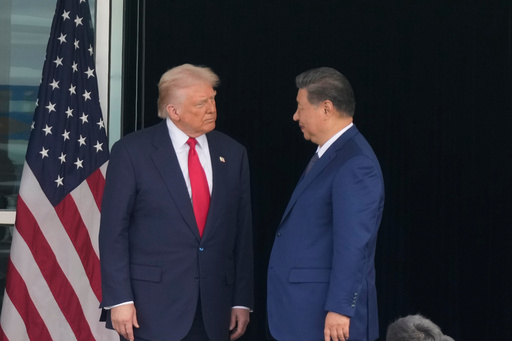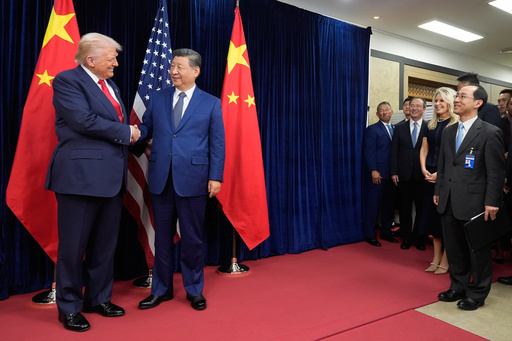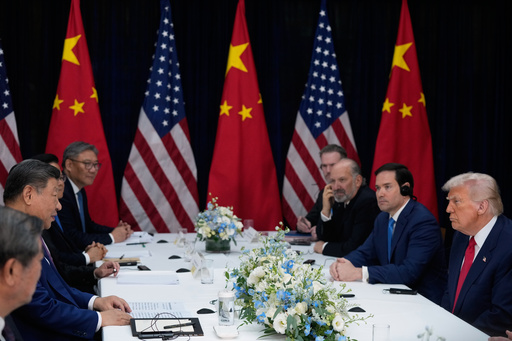Trade takeaways from Trump's meeting with Chinese leader Xi
News > Politics & Government News

Audio By Carbonatix
6:08 AM on Thursday, October 30
By ELAINE KURTENBACH
BANGKOK (AP) — U.S. President Donald Trump said he had an “amazing” meeting Thursday with China’s top leader Xi Jinping that produced very important decisions. The first official Chinese comments on the meeting were less specific and suggested any trade deal is not done.
Trump met with Xi on the sidelines of Pacific Rim summit gatherings in South Korea, where the two leaders agreed to dial back some of their trade measures and work together to resolve others.
The one hour and 40 minute meeting's agenda appears not to have touched on some perennial problems such as tensions over the self-governed island of Taiwan.
But Trump said China had agreed to buy large quantities of American farm products and to ensure steady supplies of rare earths elements used in many industries. Here are some of the key takeaways from the meeting, based on comments by Trump and U.S. and Chinese officials:
Trump told reporters while heading home on Air Force One that he had agreed to cut his 20% tariff increase, imposed over China's role in producing fentanyl and chemicals used to make it, to 10%. China confirmed that will take average tariffs on Chinese goods to 47%, down from 57%.
The two sides agreed to continue to work on cracking down on illicit flows of the drug into the U.S.
Other tariff increases remain in place, but for now, the two sides have extended a truce on even steeper tariff increases that began in May when Trump and Xi agreed to allow time to work on a framework for resolving trade tensions.
Trump said he discussed U.S. sales of computer chips to China. Trump and former President Joe Biden had imposed restrictions on access to the most advanced chips such as those used for artificial intelligence.
China will speak with Silicon Valley chipmaker Nvidia about purchasing their computer chips, he said.
That won't include its next-generation Blackwell AI chip, he said, “but a lot of the chips.”
“We make great chips,” Trump told reporters on Air Force One. “Nvidia’s the leader.”
Trump said the Chinese side has committed to buying “a tremendous amount” of American soybeans, sorghum and other farm products.
The Chinese side did not provide any details, but U.S. Treasury Secretary Scott Bessent later said China had agreed to buy 25 million metric tons of U.S. soybeans annually as part of the agreement. China will start by purchasing 12 million metric tons of soybeans from America between now and January, he said.
Beijing took aim at U.S. agricultural exports soon after Trump began announcing hikes on tariffs after he returned to the White House in January. Cutbacks in Chinese purchases of soybeans, beef and other products have hit U.S. farmers hard.
“Farmers should immediately go out and buy more land and larger tractors,” Trump wrote in a post on Truth Social. “I would like to thank President Xi for this!”
The U.S. soybean industry grew in response to Chinese demand starting back in the 1990s, when China began its rapid economic rise and turned to foreign producers to help feed its people. Protein-rich soybeans are an essential part of the diet.
While China relies on domestic crops for steamed beans and tofu, it needs far more soybeans for oil extraction and animal feed. In 2024, China produced 20 million metric tons of soybeans, while importing more than 105 million metric tons.
There were no specific details on other purchase agreements.
American consumers and businesses should benefit from the tariff reductions and resumed trade in rare earths and soybeans, economists said. Yet the trade relationship between the two largest economies remains fraught and uncertain.
“The tariff relief is actually good news for consumers — it is substantial,” said Mary Lovely, a senior fellow at the Peterson Institute for International Economics. It also helps U.S. companies that may have been considering shifting their sourcing to other counties, such as Cambodia and Vietnam, because tariffs on Chinese imports.
“It’s made it less urgent in some areas to move away from China,” Lovely said. “On the other hand, there was no real lasting peace here either. Most of the really difficult issues were just punted down the road.”
While soybean farmers will likely welcome the resumption of exports to China, “you know that if Trump does something that gets them angry, that’s off the table,” she added. “So good news for the farmers. But if I were a farmer, I might still be thinking about diversifying.”
Beijing said it will work with the Trump administration to resolve issues related to TikTok’s ownership.
“China will work with the U.S. to properly resolve issues related to TikTok,” China’s Commerce Ministry said after Xi's meeting with Trump.
It gave no details on any progress toward ending uncertainty about the fate of the popular video-sharing platform in the U.S. The Trump administration had been signaling that it may have finally reached a deal with Beijing to keep TikTok running there.
Trump told reporters that China had agreed not to tighten restrictions on exports of rare earths and the technology and equipment used to process them. Trump earlier had threatened a 100% import tax because of China’s rare earth restrictions.
“That roadblock is gone now,” he said. He said Beijing had agreed not to implement for a year its recently announced controls that had raised concerns over access to the critical minerals used in many industries, including electric vehicles and aircraft.
China and the U.S. likewise said they would not impose higher port fees on each other's vessels.
In his post on Truth Social, Trump said China had agreed to begin purchasing oil and gas from Alaska, adding that officials would be meeting to see “if such an Energy Deal can be worked out.”
Xi noted that negotiating teams from both countries had reached a consensus, a likely reference to talks held in Malaysia last weekend, according to a report on the meeting distributed by state media.
The Chinese leader said the teams should complete follow-up work as soon as possible to deliver tangible results that will provide “peace of mind” to China, the U.S. and the rest of the world.
The recent twists and turns in the relationship offer lessons for the U.S. and China, Xi said. The U.S. and China should have positive interactions on the global stage that demonstrate their responsibility as major powers to achieve positive results for their countries and the world, he said.
“Both sides should take the long-term perspective into account, focusing on the benefits of cooperation rather than falling into a vicious cycle of mutual retaliation,” he said, according to the report.
Stressing that dialogue is better than confrontation, Xi listed a range of issues where China and the U.S. could work together, including combating illegal immigration and telecom fraud, anti-money laundering efforts, artificial intelligence and handling infectious diseases.
___
Associated Press writers Josh Boak, Chris Megerian, Mark Schiefelbein and other AP journalists contributed to this report.









